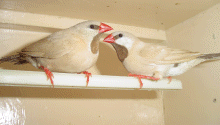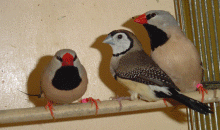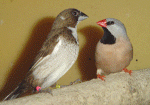|

A pair of
Fawn Hecks Grassfinches |
BREEDS & their NEEDS
HECKS GRASSFINCHES
Australian Grass Finch
Hardy &
suitable for Novice Bird-Keeper
Article &
Photos by Alison Robertshaw
|

2 Cock Hecks with Bicheno (Owl
Finch) |
Hecks Grassfinch
-
The Hecks Grassfinch originates from Australia
and measures 5-6 inches in size. Bengalese + Hecks
▼
Bengalese + Hecks
▼
-
They are a hardy bird and would suit beginners to
the bird-keeping hobby.
-
They are peaceful but very inquisitive birds.
-
they have distinctive red
beaks and black bibs
-
average lifespan 5-7 years.
Diet
-
Feed them a foreign finch seed mix and
occasionally spray millet.
-
They relish broccoli, cress, apple and small
amounts of lettuce.
-
Always supply cuttlefish bone, mineralised grit
or oystershell grit, especially in breeding season.
Courtship display
-
Hecks ‘ head bob ‘ to greet mates and flock
members, which is quite comical to watch.
-
During courtship display the cock bird bobs his
head while one or both feet leave the perch then commences
to sing while standing in an erect position facing the hen.
Housing
Compatability
Sexing
-
Sometimes sexing can be difficult visually.
-
Generally the cock birds’ bib is larger and the
black bar across the flanks is broader.
-
To be 100% sure it is best to go by the cocks’
song.
2 Cock Hecks (Red Beaks) + 2
Bengalese
The different Mutations:
Feeding in
preparation for Breeding
-
I feed breeding pair Egg Food
/ mealworms
prior to breeding.
- as this
ups the Protein Levels needed prior to bringing the birds
into Breeding condition.
-
I often mix my eggfood with cous cous.
-
feed eggfood and soaked seed for young.
Breeding
-
When breeding Hecks provide a finch nest box or
domed nest basket

-
Have also experienced a pair using a canary nest
basket lined with a nest felt .
-
The cock bird used coconut fibre and weaved an
elaborate domed top leaving a small entrance hole.
-
I tend to breed Hecks from April to September ( other people may
differ )
-
They can breed from 10 months
INCUBATION
-
They do not start to incubate the eggs until the
clutch is complete.
-
Normally 4 – 6 eggs in a clutch.
-
Incubation 12 - 14 days.
-
At 9 – 10 days of age the parents no longer brood
the chicks during the day.
AGE the CHICKS
FLEDGE
CLOSE RINGING
-
Approx.
age to Close Ring - 10days
-
Split rings best put on just
before the chicks leave the nest when they are fully feathered
-
closed
and split aluminium Size
C
-
plastic
split size
XF
 ^Top
^Top |